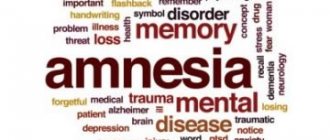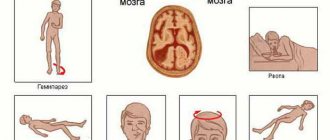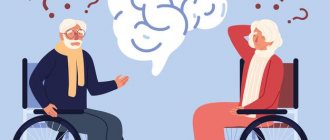The brain has great capabilities: a person is not only able to learn new things, but also remembers the necessary information.
However, as a result of exposure to external factors, anterograde amnesia can occur: a person forgets about any events. Read more about the disease and how to deal with it in the article below.
What it is?
The disease is called a memory disorder that occurs after the progression of pathology or injury. The disease develops due to disturbances in the movement of information from short-term to long-term memory.
Neurologists call it a type of lacunar amnesia and claim that the condition occurs in fairly rare cases.
Anterograde amnesia is coded according to the 10th International Classification of Diseases as R41.1.
Typically, amnesia persists for several hours or days after exposure to the causative factor . Over time, memory may return, but small gaps in the post-traumatic period will remain. The patient does not lose learning skills: if desired, he can learn new skills.
What is anterograde amnesia?
This pathological condition is a violation of memory about events occurring after the occurrence of the deviation. The patient cannot remember what is happening to him.
Old memories remain: a person often remembers well what happened a long time ago.
The transition of information from short-term memory to long-term memory is disrupted, which makes it impossible to remember and reproduce the sequence of actions performed or information heard.
It can develop gradually: at first the patient quickly forgets what happened a few minutes ago, then stops remembering what happened within a minute. The duration may vary: sometimes the pathology goes away in 2 days, in other cases - in several months, and in severe forms it can drag on for years
In this case, the patient should not be released alone: a person can easily get lost and is not able to return home on his own.
Characteristic symptoms are headaches, inability to navigate in space, and increased anxiety. Depressive states may occur. The person feels confused, constantly wants to sleep, and cannot remember new things. Problems often arise with attention: it becomes difficult to concentrate on anything. Patients may not recognize relatives and friends. Often lost memories are replaced by imaginary ones that never happened.
Possible causes of this type of memory loss
Anterograde amnesia has risk factors that contribute to the development of the disease:
- advanced age;
- received TBI;
- infectious processes;
- mental disorders.
The main causes of memory loss of this type:
- use of general anesthesia during surgery;
- infectious brain damage;
- TBI;
- exposure to a severe psychotraumatic situation;
- mental disorders of an organic nature - epilepsy, senile dementia;
- atrophy and degenerative cerebral damage in the elderly;
- neuroendocrine pathology;
- severe form of common diseases;
- stress;
- use of increased dosages of benzodiazepines;
- neoplasms in the brain;
- excessive drinking;
- intoxication.
Risk factors
Most often, anterograde amnesia affects elderly people, patients with neurological disorders due to TBI, mental disorders, and infectious lesions of the central nervous system. Doctors identify several dozen more risk factors. Some of them do not even have a pathological origin.
The most common causes of anterograde amnesia:
- taking benzodiazepines inconsistently with a doctor or violating the treatment regimen. Other sedative or hypnotic medications may also pose a danger;
- complications arising from local or general infectious diseases;
- old age, against the background of which irreversible structural changes occur in the brain. Anterograde amnesia is one of the symptoms of Alzheimer's disease;
- mental disorders of organic origin, for example, mental retardation;
- lesions of the central nervous system leading to loss of consciousness - epilepsy, coma;
- traumatic brain injuries of any severity;
- psychosomatic disorders, negative psycho-emotional factors in the form of stress, depression, mental exhaustion;
- acute or chronic cerebrovascular accident;
- intoxication due to poisoning with alcohol, drugs, chemicals;
- neuroendocrine diseases.
Read also: Causes, symptoms and treatment of alcoholic amnesia
Epilepsy can be a cause of pathology.
Even factors that seem insignificant at first glance, such as poor nutrition and strict diets, influenza and ARVI, pose a danger to the functioning of memory. Anteroretrograde amnesia can also be a consequence of such stimuli. This condition includes two forms of memory loss at once and is characterized by the loss of memories for the period both after the onset of the traumatic moment and before it.
Clinical picture: specific manifestations
Anterograde amnesia is characterized by the following manifestations:
- loss of memory for events and information received immediately after surgery or injury;
- preservation of memories associated with what happened before the illness.
What signs are not symptoms of this disease?
There are signs whose appearance cannot be regarded as the development of the disease . These include:
- Headache.
- Absent-mindedness with loss of attention.
- Confusion.
- Drowsiness.
- Visual impairment.
- Panic attacks, depression.
- Disorientation in space and time.
The listed symptoms are manifestations of many neurological diseases . In addition, anterograde amnesia is not characterized by a memory disorder about events that happened in the distant past. For example, the patient must confidently name actions from his childhood, say his name, age.
Read about other types of amnesia, their causes and manifestations:
- retrograde and transient global;
- children's (infantile);
- memory loss after alcohol abuse.
Types of amnesia
Typically, the following main possible types of amnesia are distinguished, manifested by different symptoms:
- retrograde;
- anterograde;
- anteroretrograde;
- congrade;
- transient;
- retarded;
- fixation;
- dissociated;
- dissociative fugue;
- childhood amnesia;
- post-hypnotic amnesia.
A type of retrograde amnesia means that a person is unable to remember what happened to him in the pre-morbid period. It is this type of amnesia that writers and directors most often demonstrate in their works, and it is precisely this type that almost all people know about, even those who were not previously interested in the phenomenon of amnesia.
With anterograde amnesia, a person is unable to remember events that happen after the onset of amnesia. At the same time, the patient can remember everything that happened to him before the disease. A person may experience retrograde and anterograde amnesia together, and then it is called anterograde .
Congrade amnesia implies the inability to remember events that occurred around the patient while he was in a coma, in a state of stupor or stupor (impaired consciousness). During the period of coma and stupor, such amnesia is complete, and during stunning it is partial.
With transient amnesia, a person loses memory for a period of time that does not exceed several hours. It is characterized by impaired short-term memory, the inability to remember what happened earlier in the previous days, months, years. However, during the occurrence of this type of amnesia, the ability to solve complex problems, count, and remember one’s name and the personalities of loved ones remains.
A feature of retarded amnesia is the fact that memory loss occurs during a period of disorder of consciousness or a painful mental state, but it occurs only after a certain time has passed after the patient has returned to clarity of consciousness.
Fixation amnesia is manifested by loss of memory for events happening to a person at a given time, for current events. This type of amnesia acts as one of the components of the symptoms of Korsakoff's syndrome, during which complex retrograde and anterograde amnesia develops, combined with other symptoms.
With dissociative amnesia, the memory of general knowledge remains intact, but facts and events from personal life “fall out” of memory. In most cases, the cause is psychological trauma and then, thanks to the protective mechanism of mental activity called “repression,” unpleasant facts from the patient’s life are forced out of the sphere of consciousness into the unconscious, since they are considered potentially traumatic for the individual’s psyche.
Dissociative fugue is a more complex and serious memory disorder, which is characterized by the unexpected move of patients to another place of residence and the fact that they completely forget their own biographical and personal data (even their name) there. This pathological condition can last from a couple of hours to several months (sometimes longer). After this state passes, the person suddenly regains the memory of his past. It is characteristic that patients often do not remember anything that took place during the fugue period.
Infantile amnesia and post-hypnotic amnesia , in their essence, are not pathologies and are common to almost all people. Childhood amnesia is the inability to remember what happened to a person in early childhood (the reason for this may be the insufficient development of certain parts of the brain or unpleasant events occurring during this period that one simply does not want to remember), and post-hypnotic amnesia is the inability of a person to remember what happened to him during being in a state of hypnotic trance.
Step-by-step diagnostic algorithm
If the patient notices loss of short-term memory, he should consult a neurologist . The doctor will collect anamnestic data, a neurological examination and various pathophysiological studies.
Quite often, the patient requires the help of other specialists - a psychologist, psychiatrist, psychotherapist, oncologist.
During the conversation, the neurologist must establish exactly when the loss of memories occurred and what preceded it. Various medical research methods help to diagnose antegrade amnesia:
- CT and MRI of the brain. Studies can detect pathological foci and exclude diseases with similar symptoms.
- EEG. Allows you to evaluate the pulsed electromagnetic activity of the brain.
- Biochemical study of blood and cerebrospinal fluid. Diagnostics allows us to identify inflammatory processes or various hemorrhages in the brain.
- Toxic analysis. It is necessary to detect high doses of drugs or substances that cause poisoning of the body.
The specialist performs a special memory function test . This will allow you to get a complete picture of the patient’s condition.
Diagnostics
A person with suspected anterograde amnesia requires comprehensive help from a neurologist, psychiatrist and psychologist.
It begins with diagnosing the condition, establishing the form of memory loss, and identifying its causes. The most informative methods are considered to be MRI and CT of the brain, various studies of the vessels of the cranium, and EEG. A mandatory point is a pathopsychological examination, which allows you to assess the mental state of the subject. Additionally, to diagnose amnesia, biochemical and toxicological blood tests are performed, and cerebrospinal fluid is studied. Read also: what is amnesia and how to deal with it?
Treatment: what is its specificity?
Pathology requires hospital treatment of the patient . The doctor will be able to monitor the patient’s condition, make a diagnosis and prescribe appropriate therapy. Depending on the severity of the disease, treatment can take from several weeks to months.
The goal of therapy is to eliminate the disease that led to memory loss and restore forgotten events and information.
The doctor prescribes the following groups of medications:
- Nootropic drugs. They normalize cerebral microcirculation, bioelectrical activity and integrative activity of the brain, improve information exchange.
- Neuroprotectors. Protect neurons from various types of influences and damage.
- Psychotropic drugs. They have anxiolytic, sedative, hypnotic, muscle relaxant and anticonvulsant properties.
- Vasoactive drugs. They improve blood supply to the brain tissue.
- Antidepressants. Used to treat depression.
The doctor sometimes recommends neuropsychological correction and physiotherapeutic treatment to the patient (acupuncture, color therapy, low-intensity electrical stimulation).
Related brain regions
One of the main tasks of modern neurobiology is to find out which areas of the brain play a role in anterograde amnesia . In general, the brain damage that causes it is thought to occur in the hippocampus and medial temporal lobe.
These areas of the brain act as a passageway where events and facts are stored temporarily until they are stored more permanently in the frontal lobe. The hippocampus as a storage facility for short-term memory .
If it cannot store information correctly, it will not be able to reach the frontal lobe. This means that the brain cannot form long-term memories. In cases of partial amnesia, memories can be formed but have very little actual detail.
However, although the hippocampus may seem to be the most important area of anterograde amnesia, recent research suggests that other brain structures also play a role . In particular, damage to the basal forebrain also appears to interrupt memory formation.
This area is responsible for the production of acetylcholine, a very important substance for memory function, initiation and modulation of the processes involved. The most common type of brain injury is an aneurysm, which is often associated with anterograde amnesia.
Finally, the association between amnesia and Korsakoff's syndrome points to a third area that may play a role in the development of anterograde amnesia. The diencephalon is the area that is affected by Korsakoff's syndrome. Recently, researchers have begun to study the involvement of the diencephalon in amnesia.
Prognosis and prevention
Treatment measures may not be effective for all patients. The success of therapy depends mainly on the cause that provoked the onset of the disease.
If atrophic or degenerative damage has occurred in the brain, memory loss may become permanent. In other cases, timely and adequate treatment leads to memory restoration.
To prevent anterograde amnesia, you should follow simple rules:
- Complete cessation of bad habits: alcohol, smoking, drugs and psychotropic drugs.
- Regular stimulation of brain activity: memorizing and composing poetry, solving crosswords, puzzles.
- A healthy balanced diet, including the necessary composition of vitamins and other nutrients.
- Daily walks in the fresh air.
- Sports and physical education.
- Avoiding head injury.
- Reducing psycho-emotional stress.
If a patient exhibits manifestations of anterograde amnesia, timely and complete treatment aimed at restoring lost memory is necessary. If he is in a high-risk group, he should consult a doctor immediately. A specialist will help prevent such a disorder.
Korsakoff's syndrome
Of all the organic types of amnesia, Korsakoff's syndrome is the most common. It is caused by a deficiency of thiamine in the brain, usually due to chronic alcoholism. It was named after Sergei Korsakov, the man who discovered it.
Korsakoff's syndrome is characterized by acute mental distress and spatiotemporal disorientation .
Often, the onset of Korsakoff's syndrome follows an acute episode of Wernicke's disease or Wernicke's encephalopathy. When both occur together, it is called Wernicke-Korsakoff syndrome.
The main symptoms of Wernicke-Korsakoff syndrome include:
- ataxia (lack of coordination);
- ophthalmoplegia (paralysis of the eye muscles);
- polyneuropathy (pain and weakness in the same parts of the body on both sides).
People with Wernicke-Korsakoff syndrome also suffer from:
- disorientation in time and place;
- inability to recognize family members;
- apathy;
- attention deficit;
- inability to carry on a coherent conversation.
Features of short-term memory loss
Short-term amnesia is a sudden memory loss, the duration of which varies from 3-4 minutes to 1-3 days. This pathology can be isolated or may recur 2-3 times a year. At the same time, patients lose the ability to reproduce events of any time ago, record new information, and confusion develops. However, patients retain access to the following information: their own name, the names of loved ones, and are able to perform simple mathematical operations.
Important! With short-term amnesia, the patient is aware of the presence of memory problems, but is not able to understand what is happening and is confused in space and time.
- Stroke. Poor blood circulation in the brain provokes the death of neurons and a change in their functionality;
- Depressive state. Long-term depression provokes the development of a chemical imbalance in the gray matter of the brain, which has a negative effect on memory and concentration;
- Mental trauma. Our consciousness tries to block any memories of a traumatic experience, which can lead to short-term memory impairment;
- Brain injuries. Damage to neurons provokes the development of amnesia; such memory impairment may disappear over time;
- Alcohol and drug abuse. The listed drugs cause intoxication of the body and lead to brain hypoxia;
- Insufficient dietary intake of vitamins B1 and B12, which are necessary for the normal functioning of the nervous system;
- Sleep disturbance. Insomnia leads to disruption of the functional activity of neurons, which provokes the occurrence of short-term amnesia;
- Pathologies of the thyroid gland;
- Infectious diseases (meningitis, neurosyphilis);
- Taking antidepressants, relaxants, tranquilizers.
In most cases, short-term amnesia goes away on its own. However, in some situations, complex treatment is required to alleviate the patient’s condition and restore memory. Treatment tactics should be determined exclusively by a specialist after a thorough diagnosis.
The following treatment regimen is widely used:
- Mind games. Neurologists recommend doing special exercises daily to improve memory;
- Drug therapy. Short-term amnesia can occur against the background of mental pathologies, so to normalize the condition it will be necessary to cure the underlying disease. It is also recommended to take drugs that improve cerebral circulation and neuron functionality;
- Diet food. The daily diet should include porridge, fresh and baked vegetables, fruits, and fish. Avoid eating foods rich in saturated fats, red meat, and alcohol;
- Regular moderate physical activity. Physical activity normalizes the processes of oxygen transport to neurons and local blood flow.
Possible causes of amnesia, memory loss
Memory loss – causes of amnesia, symptoms.
Dissociative fugue - when a patient goes somewhere and completely forgets his biography for months and hours, rarely even longer, and suddenly he can remember everything and so quickly forget the events that happened when the fugue occurred - this is psychogenic amnesia.
Dissociated amnesia is the loss of facts from personal life, recent important events, while all other events and skills are preserved. Most often it occurs during the loss of loved ones, tragic events and mental trauma. There is no overwork, intoxication and organic brain damage. Memory disappears only while awake; with the help of hypnosis, the patient can restore all events from memory.
Post-hypnotic amnesia - it is impossible to remember what was done during hypnosis.
Amnesia may be a single manifestation of the disease, or it may be combined with aphasia, apraxia, or agnosia. The patient can replace his past memories with false confabulations, or distort events that happened to him - this is called paramnesia.
Diseases that can provoke amnesia are: emotional shock, epilepsy, mental illness, tumors, degenerative brain diseases, metabolic encephalopathy, intoxication, herpetic encephalitis, traumatic brain injury, and stroke.
Anatomical structures that ensure the functioning of memory are the frontal lobes, temporal lobes, hypothalamus, mediodorsal nucleus of the thalamus and mammillary bodies. The mediabasal system ensures the speed of recording new information, recognition, perception, learning, and memorization. The cerebral cortex is a large repository of long-term memory. The cerebellum, amygdala, and cortex supply procedural memory. Memory is modulated by dopaminergic, serotonergic, noradrenergic, and cholinergic systems of the brain. The storage and acquisition of new data is supplied by post-tetanic potentials, especially in NMDA glutamate neurons and hippocampal receptors. Damage to these structures can cause memory loss (amnesia).
Disease prevention
At the initial stages of the disorder, it is necessary to provide proper pharmacotherapy and neuropsychological correction.
Elderly people need to be provided with psychological and pedagogical support, i.e., create conditions in which they will realize themselves, feel less discomfort due to their age, enjoy it and see the positive aspects. With proper support, they will also have the opportunity to intensify the processes of reflection and rethinking of their own values, broadcast their life experiences, understand themselves from the point of view of their attitude towards their personality, as well as the attitudes of others.
Prevention options
You can prevent the development of retrograde amnesia and other types of memory impairment by following the recommendations of psychiatrists:
Traumatic brain injuries caused by carelessness during professional activities or sports should be avoided. Do not drink alcohol or drugs, as they can lead to severe intoxication and impaired brain function. Nutrition should be rational and contain the required amount of vitamins and microelements. For this purpose, the amount of fruits, vegetables and berries in the diet is increased. If you have somatic diseases (atherosclerosis of the carotid arteries, circulatory disorders, etc.), you should promptly seek medical help and adhere to the treatment selected by your doctor. A healthy lifestyle and preventive medical examinations reduce the risk of neurological and mental disorders, including various types amnesia
A healthy lifestyle and preventive medical examinations reduce the risk of neurological and mental disorders, including various types of amnesia.









